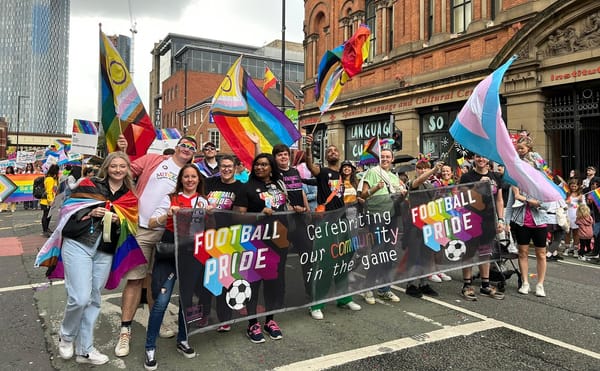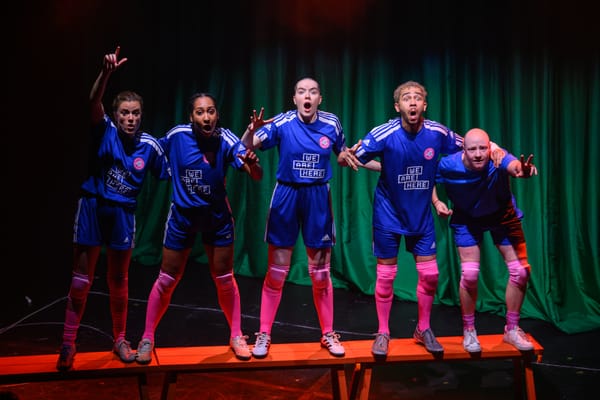In countries where queer people might be ostracised, women’s football provides a safe space
For Priyankka, football was a space to interact with queerness in a way that wasn't intimidating.
This newsletter often covers how football can provide community for LGBTQ+ people, but in a non-western context, it can provide safety too. This week, Priyankka explores how, growing up in Malaysia, football helped her to accept her identity.
As always, if you enjoy reading, please share Priyankka’s writing. It makes a massive difference.
Enjoy.
Adam
By Priyankka
The narrative surrounding football culture and the LGBTQ+ community is traditionally negative, and rightly so. Having grown up a queer woman in South East Asia, my experience from mainstream footballing culture has always been slightly detached. Football is a fundamentally divisive space that has always centred on white cis men. Especially after last year's highly debated world cup in Qatar, the conversations surrounding the safety and involvement of the LGBTQ+ community are at the forefront of sporting discourse.
But women's football often goes against this narrative. It has long been a safe place for lesbian women and is increasingly improving to accept all women and non-binary people into their spaces, especially at the grassroots level. Within London alone there are a ton of grassroots initiatives and clubs that aim to be inclusive for people of all races, genders and sexualities. In doing this football becomes far more than just a sport, and the sense of community that comes with it is incredibly powerful.
The safe community that women's football fosters is especially powerful within a non-western context. While the global south should not be synonymous with conservativeness, much of this region still heavily politicises gender and sexual performance, with many of these policies having deep colonial roots. In these communities, football often provides a safe space for queer people where they would otherwise be ostracised.
While you might associate football teams with that negative narrative, at their heart, teams are communities and can be used to support LGBT people as much as they can harm them. The sense of community that football fosters is important as it allows for the local queer community to push past stigmas, both within themselves and in their communities, to find acceptance and push for long term cultural changes.
Japan’s women's football team is a great example of this. While gender and sexuality is criminalised in Japan, the queer community there still faces significant social barriers. Japanese footballers have been trying to change this. Shiho Shimoyamada for example uses her coming out as a platform to push for LGBTQ+ acceptance in Japan ahead of the Tokyo Olympics, starting a widespread discussion within the Japanese community surrounding acceptance, tolerance and conformity. Kumi Yokoyama is another trailblazer in this space, after coming out as trans. They used this opportunity to discuss the societal pressure to remain closeted in Japan and the cruel policies surrounding trans rights, including how Japan requires trans people to have their reproductive organs removed to have their gender recognised on official documents.
Lotus Sports Club in Cambodia provides another example, providing a lifeline for local trans queer teens. Led by their transgendered coach, Pa Vann Sovann, the club has become one of the only places where trans youth find acceptance in a country where gender affirmation care is not widely available.
On a personal level, growing up in Malaysia the first time I ever met a gay woman in real life was while playing football. More importantly, it was the first time I ever interacted with ideas of queerness in a way that wasn’t intimidating. As someone who hadn’t met any openly queer people in her life, before I found football, I saw queerness as something that defined you. Anyone who I knew was gay was gay before anything else.
In sharing these spaces in football, queerness became normalised for me and that helped me with my sense of identity and coming to terms with my own sexuality. It allowed me the chance to have agency over the space I occupied as a queer person in a part of the world not accepting of this, and was honestly pretty emancipating.
So much of the mainstream narratives and discussions surrounding LGBTQ+ rights are taken from a western point of view. It tends to not only centre the experiences of white queer people, but also frames the experiences of queer people outside a western context as a development or cultural issue. This allows white saviorism to seep into a ton of these discussions. This is why football was so important to me, and so many people around me. It allowed me to find a community and safe spaces without the imposition of western narratives that are often rooted in homonationalism and white saviorism.
Football is so much more than just a sport. The sense of community that it fosters is important as it allows for the local queer communities to push past stigmas, both within themselves and in their communities, to find acceptance and push for long term cultural changes. It has for me and countless people I know.
While mainstream football is increasingly being more queer inclusive, on a grassroots level it has been on this path for years. It’s like two-time World Cup Winner Megan Rapinoe once said, “You can’t win a championship without gays on your team. That’s science right there!”



